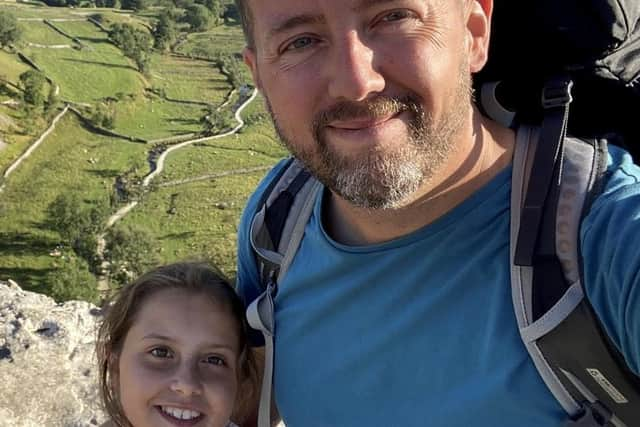Dad of Yorkshire schoolgirl with inoperable brain tumour describes devastation at diagnosis
Chris Toseland's daughter Thalia Fili Toseland, ten, was told she had diffuse intrinsic pontine glioma (DIPG) in March this year.
It's a high grade childhood tumour which develops in a part of the brain stem known as the pons, which controls essential bodily functions such as breathing.
Advertisement
Hide AdAdvertisement
Hide AdAs Thalia's brain tumour is in a sensitive location, it cannot be removed which Chris – a senior lecturer in cancer biology at the University of Sheffield - said is just 'devastating.'


He said: "When we were told Thalia had a DIPG and it was inoperable, it was like a sledgehammer had come down on us.
"There's no standard clinical approach to this type of disease and it's hard to comprehend that nothing can be done.
"In the UK, there are very limited options.
"There are more options abroad but only at trial stage, so it is experimental.
"Our whole life as we knew it changed in an instant.
Advertisement
Hide AdAdvertisement
Hide Ad"It's devastating but my wife, Natali, and I haven't had the time or brain space to contemplate it.
"We're just riding a wave which we know will crash."
The first indication something was wrong with Thalia was in February this year when she was struggling to control the movement in her left hand and left leg.
But now she's completed six weeks of radiotherapy at St James' University Hospital in Leeds and Chris, 39, has said some of her 'hand control has returned.'
Chris, of Sheffield, said: "It has taken up so much of our time and is so tiring, but it has been worth it because it has had a positive impact.
Advertisement
Hide AdAdvertisement
Hide Ad"Some of her hand control has returned and she has more strength in her foot.
"The double vision she had has completely gone and she is now much more alert than she was.
"We will meet the cancer team in Sheffield next week to discuss the next options which include chemotherapy and the possibility of going abroad for a clinical trial."
Chris is now campaigning alongside Brain Tumour Research to help reach 100,000 signatures on its petition to increase research funding.
Advertisement
Hide AdAdvertisement
Hide AdThe charity are also calling on the government to increase the national investment in brain tumour research to £35 million a year, by 2028.
Chris added: "I've signed the petition and encourage others to because money is so important; without it, there is no research.
"The government needs to invest much more into studying DIPGs because so much is still unknown about them."
Matt Price, community development manager at Brain Tumour Research, said that he hopes that the petition will 'help find a cure' for brain tumours.
Advertisement
Hide AdAdvertisement
Hide AdHe said: "We are so grateful to Chris for sharing Thalia's story, and supporting our petition.
"For too long governments have put brain tumours on the 'too difficult to think about' pile.
"Five years after the Government announced £40 million for brain cancer research, just £15 million has been spent.
"Patients and families continue to be let down by a funding system that is built in silos and not fit for purpose.
Advertisement
Hide AdAdvertisement
Hide Ad"If everyone can spare just a few minutes to sign and share, we will soon hit the 100,000 signatures we need and help find a cure, bringing hope to families whose loved ones have been affected by brain tumours."